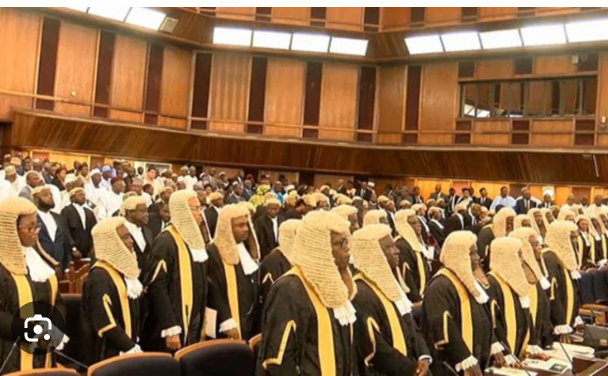
The National Judicial Council has picked 11 Justices that will fill the vacant positions at the Supreme Court.
The constitution prescribes 21 Justices for the apex court but the court currently has 10 Justices, following the retirement of Justice Musa Dattijo in October.
Last week, The PUNCH exclusively reported that the NJC screened 22 candidates shortlisted by the Federal Judicial Service Commission.
However, on Wednesday, the NJC uploaded the names of the successful candidates on its website.
Among the shortlisted candidates is Justice Haruna Tsammani from Bauchi State, who chaired the Presidential Election Petition Court that affirmed the election of President Bola Tinubu in the February 25 presidential poll.
Also on the list is Justice Moore Adumein, from Bayelsa State; Justice Jummai Sankey (Plateau); Justice Chidiebere Uwa (Abia); Justice Chioma Nwosu-Iheme (Imo); Justice Obande Ogbuinya; Justice Stephen Adah(Kogi); Justice Habeeb Abiru (Lagos); Justice Jamilu Tukur; Justice Abubakar Umar (Kebbi) and Justice Mohammed Idris( Niger).
The NJC is expected to forward the names to the President for approval before Friday.
Meanwhile, the NJC also recommended the appointment of Justice Mohammed Ahmed Ramat to the Court of Appeal.
Also, Justice Joel Agya and Justice Umar Abubakar were recommended as the Chief Judge of Taraba and Kebbi states, respectively.
Similarly, Kadi Mukhtar was recommended for appointment as the Grand Kadi Sharia Court of Appeal in Kebbi State.
Justice A. O. Femi-Segun; Justice Alfred Yakubu; and Justice Tajudeen M. Abdulganiyu were recommended to be appointed as Presidents of the Customary Courts of Appeal of Ogun, Taraba, and Oyo states.
Furthermore, Amaebi Orukari and Akinyemi Ayodele were recommended to be appointed as High Court judges in Bayelsa and Ogun states, respectively.
A statement by the NJC spokesperson, Adesoji Oye, on Wednesday, said, “All recommended candidates to the Supreme Court bench would be sworn in after the approval of their recommendation by President Bola Tinubu, GCFR, and the subsequent confirmation of their appointment by the Senate.
“The various Heads of Court recommended would also be sworn in upon the approval of their appointment by their various state governors and subsequent confirmation of same by their respective state Houses of Assembly.”













